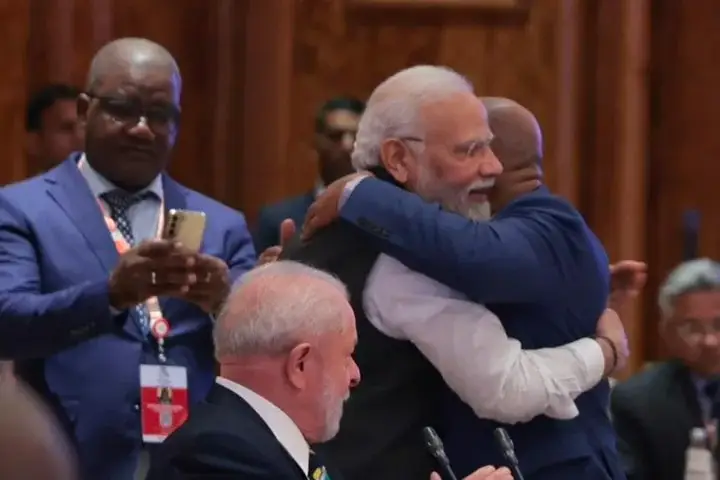

Prime Minister Narendra Modi hugs President of the Union of Comoros and Chairperson of African Union Azali Assoumani as AU becomes part of G20
For Africa and the rest of the world, India’s G20 Presidency will be etched in history as the African Union (AU) was granted membership of the inter-governmental group.
AU, headquartered at Addis Ababa in Ethiopia, is the second regional bloc to have got the membership as G20 moves to become G21. The European Union is also a member of the group.
The inclusion of AU will overshadow the focus of several members on the Russia-Ukraine war and the absence of Chinese President Xi Jinping. The move will cement India as the voice of the Global South.
This membership, for which we have long been advocating, will provide a propitious framework for amplifying advocacy in favor of the Continent and its effective contribution to meeting global challenges,” Moussa Faki Mahamat, Chairperson of the African Union Commission said.
Prime Minister Narendra Modi, while delivering his opening speech at the two day G20 summit today, invited Azali Assoumani, the chair of the African Union, to take his seat as a permanent member of the group.
“Honoured to welcome the African Union as a permanent member of the G20 Family. This will strengthen the G20 and also strengthen the voice of the Global South,” Prime Minister Narendra Modi said on social media X.
Rising importance of AU
Launched in 2002, AU consists of 55 member states in Africa. In the new world order, the role of AU has become amplified. Notably, the members have also signed the African Continental Free Trade Area (AfCFTA), the world’s largest free trade area. That apart, the continent is rich in natural resources.
Africa is home to 60 per cent of the world’s renewable energy reserves and more than 30 per cent of the critical minerals.
Cyril Ramaphosa, South Africa’s President said that as African and other developing economy countries face the task of meeting climate commitments in the midst of significant developmental challenges like poverty, inequality and unemployment, the inclusion in the G20 frame will give the continent a voice.
“Developing economies are bearing the brunt of climate change, despite carrying the least responsibility for this crisis,” he said on X. Ramaphosa added that as African and other developing economy countries, we face the task of meeting our climate commitments in the midst of significant developmental challenges like poverty, inequality and unemployment.
Climate change, environmental degradation, unsustainable consumption and production and resource scarcity are challenges that can only be addressed collectively and with a great deal of solidarity, he said.
Also read: G20 Leaders’ Declaration will resonate Global South’s concerns as never before
At least 2,145 senior-ranking National Aeronautics and Space Administration (NASA) employees are set to leave…
Union Minister of Commerce and Industry, Piyush Goyal, on Thursday urged the industry to build…
The Association of Southeast Asian Nations (ASEAN) has urged all parties involved in the South…
India's rise as a global power must be accompanied by the rise of its intellectual…
Russia launched a large-scale attack on Ukraine's capital of Kyiv and its surrounding region on…
India and the United States have stepped up their trade talks, with both sides actively…